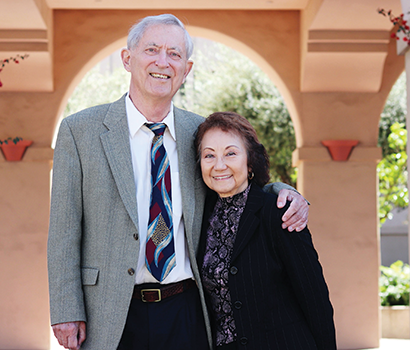 Agility has defined the nearly 50-year career of David C. Gakenheimer (MS ’66, PhD ’69). He applied his skills and ingenuity to industries as wide-ranging as national defense, oil, and dentistry. Now, his bequest to establish a professorship at Caltech will help faculty be just as nimble in their research.
Agility has defined the nearly 50-year career of David C. Gakenheimer (MS ’66, PhD ’69). He applied his skills and ingenuity to industries as wide-ranging as national defense, oil, and dentistry. Now, his bequest to establish a professorship at Caltech will help faculty be just as nimble in their research.
“It’s getting increasingly difficult for faculty to get funding and try different ideas,” Gakenheimer says. “I like the idea of funding someone who will do groundbreaking work. If they need the assistance, I am really happy to help.”
AN AMBITIOUS PHILANTHROPIST
Gakenheimer’s multifaceted approach to philanthropy centers on breakthrough science and technology as well as student success. He has previously underwritten faculty research and endowed a graduate fellowship at Caltech.
With his $4 million planned gift to establish the Dr. David C. Gakenheimer Professorship, he hopes to achieve both of those goals. The professorship will provide a Caltech scientist or engineer with funds to pursue promising but untested ideas. This flexibility, combined with the prestige associated with a named position, will help Caltech recruit and retain leading researchers and instructors.
Gakenheimer is funding his professorship through a bequest from his IRAs and a testamentary charitable remainder unitrust (CRUT) comprising his real estate holdings and non-IRA financial investments. His significant others will receive a reliable income stream for life, after which the remaining balance will underwrite the professorship at Caltech.
A MOTIVATED STUDENT
From the moment he toured campus, Gakenheimer knew that Caltech’s size, rigorous education, and people were the perfect fit for him, he says. Yet the austere budget and lifestyle of a graduate student had him equally convinced that he would not overstay his time. In fact, the motivated graduate student researched, drafted, and defended his thesis on elastic wave propagation in only three and a half years.
As graduation approached, Julius Miklowitz, professor of applied mechanics and Gakenheimer’s adviser, recommended him for a position with the RAND Corporation. Gakenheimer was hired as a staff scientist and worked on national defense issues while the country was engulfed in the Vietnam War.
A VERSATILE ENGINEER
When Cold War tensions eased, Gakenheimer shifted his focus and, after a series of corporate spinoffs, mergers, and acquisitions, joined the aerospace company Logicon. There, he led a team of scientists who did pioneering work in artificial intelligence (AI) and image analysis. He found that AI’s power to enhance detection could be applied to a variety of fields. His team created sophisticated software that helped airport security workers better identify explosives in luggage and weapons on airline passengers. They worked on a new method that enabled oil refineries to reduce the release of pollutants while maximizing the quality of gasoline. And they developed technology to help dentists classify dental caries. Soon, Gakenheimer launched his own company to help dentists more effectively treat tooth decay. After 25 years, his product, the Logicon Caries Detector, continues to be used by dentists around the world.
Now retired, Gakenheimer credits his professional success to Caltech. “It was understanding the process of learning that served me well in life,” he says. “I did not need expert-level knowledge on every issue I encountered in my career. I just had to think like a researcher and be fearless.”


